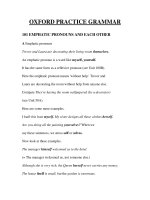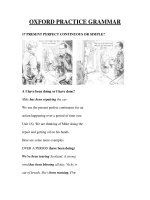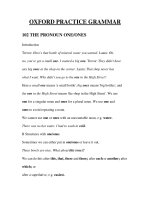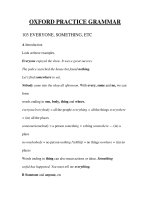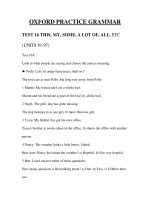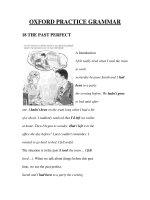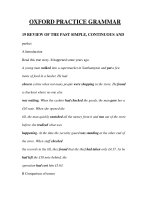Oxford practice grammar advanced tests key
Bạn đang xem bản rút gọn của tài liệu. Xem và tải ngay bản đầy đủ của tài liệu tại đây (75.62 KB, 6 trang )
Key to the Tests
Test 1
E
A
1 d
B
1
2
3
4
5
C (contained)
C (prefers)
D (put £20 in)
D (show it to me or show me it)
C (made all the young people happy)
1
2
3
4
5
begins in November
include fever
catch the flu
give it
sneezes
C
D
E
2 b
3 b
4 d
5 c
1 Nick admitted to one of the detectives that he
had taken the cash box.
2 The police persuaded us that it was too
dangerous and we were convinced.
3 The frog suddenly turned into a prince after the
princess kissed him.
4 He told us that two hours wouldn’t (or won’t) be
enough to finish the job.
5 Someone painted the wall white yesterday.
1
2
3
4
5
1
2 a
B
1 D (is having)
2 A (used to)
3 C (knew)
4 A (make)
5 C (had put)
C
1
2
3
4
5
6
7
8
D
1 By the time we sell the car, we will have spent
£300 on repairs.
2 This is the first time I have (ever) had to think
about my health.
3 Juliet has been working (or has worked) here
for about six years.
4 It’s even worse than I thought it would be.
5 It was Christmas when I (last) talked to my
parents.
was walking
thinking
were looking
had decided
3 d
4 b
5 a
saw
whispered
wasn’t wearing
hadn’t changed
Oxford Practice Grammar • Advanced • Key to the Tests
7
8
9
10
have created
lets
holds
Will … keep
A
1 d
B
1
2
3
4
5
A (may)
D (ought not to be)
D (would)
C (can)
A (had)
C
1
2
3
4
5
may not be familiar
can be used
must be paid
won’t be required
will be charged
D
1 Students are not allowed to park here.
(or Students are not permitted to park here.)
2 His trip may have been cancelled at the last
minute.
3 She didn’t enjoy having to get up at five o’clock
every morning.
4 He couldn’t have committed the crime,
according to the report.
5 This shirt shouldn’t have been (or ought not to
have been) put in the washing machine.
Test 2
1 c
is … happening
have been
be experiencing
had
believe
have … been changing
or have been … changing
Test 3
were ready
seemed quite satisfied
stood alone
is better
became clear
A
1
2
3
4
5
6
E
2 a
3 a
1 might*
2 couldn’t
3 was able to
4 would
5 be able to
6 would*
7 be willing to
8 had to
9 should
10 was … going to
*1 and 6 can be exchanged.
4 c
5 a
Test 4
Test 6
A
1 b
B
1 C (did he ask)
2 D (no longer take)
3 D (didn’t you)
C
1 Aren’t
2 what
D
1 Not only was the room cold, but it was also very
damp.
2 Who did your sister say she gave the money to?
3 What does Andreas think has been stolen?
4 She said, ‘Why don’t you (or Why not) take the
train instead of driving?’
5 They asked me what his name was and where
he lived.
E
1
2
3
4
5
6
7
8
9
10
2 a
3 d
4 c
5 a
A
1 d
4 C (do they)
5 B (not an)
B
1
2
3
4
5
B (are > is)
D (the tennis)
B (a research)
C (pairs of trousers)
C (device’s > devices)
C
1
2
3
4
The
a
the
the
D
1 Yesterday, a masked man robbed a woman
outside a (or the) post office.
2 In business news, the Bank of England is raising
(or will raise) interest rates by 1.5 per cent (or %).
3 Yesterday’s news of the murder of a priest in
Kent (has) shocked the community.
4 Reviewers have criticized a new account of
Scottish history by an English writer.
E
1 the middle of the century
2 The urgency of the challenges
3 the authors of the report (or the report’s
authors)
4 Sims’ (or Sims’s or The Sims) organization
5 the health of the earth (or the earth and the
health of)
6 the group’s latest report
7 the world’s population (or the population of the
world)
8 the destruction of the environment
3 no
4 I’m not
5 Can’t
Nothing
never
no
What … YZ-23
Why … Leisure
Who … Somebody else
Did … Yes
which … London
Where … New York
How … None
Test 5
A
1 d
B
1
2
3
4
C
D
E
2
2 a
3 c
4 c
5 c
2 b
5
6
7
8
the
–
the
a
3 c
9
10
11
12
4 b
an
–
–
–
13
14
15
16
5 b
the
–
the
the
C (married)
D (crashed)
B (with a special key)
C (being repaired or which were being repaired
or which had been repaired)
5 B (was or is located)
A
1 c
B
1
2
3
4
5
6
7
1
2
3
4
5
C
1 a lot of
2 both
D
1 Not many people are willing to help others.
2 Half the report (or Half of the report) has been
written already.
3 No explanation was given (to us) for the delay.
4 All of us want to live forever.
E
1
2
3
4
5
is experienced
was believed (or considered)
were bitten by (or had been bitten by)
could be cured by
was … recommended by
is … considered (or believed)
may (or might) be said
1 There’s a saying that Rome wasn’t built in a day.
2 The tests have been collected and the answers
(have been) checked.
3 Death is more likely to be caused by a bee sting
than a snake bite these days.
4 There were reported to be serious problems
with the new design.
5 We weren’t given instructions or shown what to
do. (or We were given no instructions … or We
weren’t given any instructions …)
1 n
2 b
3 o
4 c
5 h
6 l
7 i
8 e
Oxford Practice Grammar • Advanced • Key to the Tests
Test 7
2 c
3 b
4 c
5 c
D (some of their friends)
C (either colour or either of the colours)
C (a little information or some information)
A (all of them or they all)
A (most of Europe)
a great deal of
many
more
little
no
3 some
4 neither
6
7
8
9
10
5 the
6 a little
Most of
88 per cent
51 per cent of
twice
most
Test 8
Test 10
A
1 d
2 b
3 b
4 c
5 c
B
1
2
3
4
5
C
1 do something
2 them myself
D
1 It should have been useful having wealthy
parents, but they didn’t actually support her.
2 They don’t like each other. (or They don’t like
one another.)
3 I’m sure there will be someone at the airport to
meet you.
4 It would not be a good idea to go swimming
out in the ocean by yourself.
5 There were said to be thousands of people
affected by the rail strike.
E
1
2
3
4
B (with her)
C (the other)
D (she tastes it)
B (regarded it as an opportunity)
B (a knife was discovered)
she
me
myself
him
3 someone else
4 do it
5
6
7
8
anyone
ours
that
himself
3
2 a
3 c
4 d
5 c
B
1
2
3
4
5
C
1 away
2 from
D
1 During August this building will be closed
for renovation.
2 Besides shopping, what else did you do when
you were in Rome? (or Besides shopping when
you were in Rome, what else did you do?)
3 Apart from the apple I gave you earlier, haven’t
you eaten anything else today?
4 Without more financial support we won’t be
able to do much.
E
1
2
3
4
C (instead of)
C (on every day)
B (in)
D (over)
D (out of or in)
3 to
4 in
By
past
At
under
5 out of
6 for
5 towards
6 with
7 into
8 of
9 along
10 across
Test 11
A
1 c
B
1
2
3
4
5
C
1 already … never
2 just … further
3 longer … reading
D
1 Everyone thought the event was well-organized
and exciting.
2 The earlier you leave here, the quicker you’ll get
there.
3 Mark is not as good a cook as David.
4 I’m looking for a fairly long green woollen scarf.
1
2
3
4
5
1 a
9 one
10 anywhere
11 it
Test 9
E
A
2 b
3 b
4 a
A
1 d
B
1
2
3
4
5
A (learning)
D (refused to help)
B (to wait)
A (visiting)
D (of doing)
C
1
2
3
4
5
assumed to be
heard … sneeze (or sneezing)
remembered … telling
allowed to go
smell … burning.
D
1 A place to park is sometimes hard to find.
2 Is it really necessary to keep all these old files?
3 It would be a mistake for him to buy a new car
now.
4 Amy still remembers being bitten by a dog
when she was very young.
5 The boy denied having done anything wrong.
(or The boy denied doing anything wrong.)
E
1
2
3
4
5
5 c
D (six feet deep)
B (some soldiers who were afraid)
C (I usually drink)
A (remove ‘very’)
B (Italians)
only
earlier
yet
acutely
pleased
4 Eventually … easier
5 Suddenly … short
6 round black
6
7
8
9
10
young
Japanese
coloured
certainly
far
Oxford Practice Grammar • Advanced • Key to the Tests
2 c
trying
to look
to do
to regain
stopping
3 b
4 a
5 d
6 to keep
(or to have kept)
7 starting
8 losing
9 putting
10 going
Test 12
A
1 b
B
1
2
3
4
5
C
1 tell
2 asked
3 explained*
4 hadn’t said
*3 and 6 can be exchanged
D
E
2 d
3 b
4 c
D
1 He didn’t conceal the fact that his parents
weren’t English.
2 It has always been a big mystery to me why
anyone would want to jump out of a plane and
put their trust in a parachute.
3 Our expectation was that no one would be
there.
4 Bridget was sorry that her comments had upset
Mark’s mother.
5 Despite the fact that these apples don’t look
very nice, they’re delicious.
E
1
2
3
4
5
5 a
D (would be able)
C (agreed with me)
C (encouraged her not to quit)
A (inquired about whether)
B (offered to bring or offered to bring us)
5
6
7
8
hadn’t spoken
replied*
pointed out
talk (or talked)
1 Mrs Dalloway said she would buy the flowers
herself.
2 She asked Henry if he had left (or left) his keys in
the door.
3 There was an announcement that the strike was
over.
4 His only comment was that he would return the
following day (or the next day or the day after).
5 His statement that he wouldn’t do it surprised
us.
6 I remember one time when my aunt told me
not to talk with my mouth full. (or … my aunt
told me that I mustn’t (or shouldn’t) talk with my
mouth full.)
7 They invited me (or us) to stay at their house.
1 (that) he would be here by eight o’clock
2 if she knew where Rob was
3 (that) she thought he had gone out about half
an hour earlier
4 apologized (or said that he was sorry)
5 that he had forgotten that he had promised to
take his mother into town that morning
1 c
B
1
2
3
4
5
C
1
2
3
4
5
2 d
3 a
4 d
idea of how categorization works
we take it for granted that categories have
and that all members of a given category
we see that it is
it is not surprising that we hold
1 a
B
1 C (who, because that is not used in a nondefining clause describing a person)
2 C (along which something slides)
3 C (that or no relative pronoun, because when is
not used after ‘every time’)
4 C (which made, because reduced relatives are
not used for sudden actions)
5 D (all that, because a quantifier used as a
pronoun takes that, not which)
C
1 whose
2 that or which
3 where or in which
D
1 Elizabeth is the name from which Betty is
derived. (or Elizabeth is the name (that/which)
Betty is derived from.)
2 India is where her parents were born. (or India is
the place/country where/in which her parents
were born.)
3 Hemingway is the author whose short stories I
liked best.
4 Whatever I do, her parents will never like me.
5 I was at the first lecture during which he
talked about humanism. (or I was at the first
lecture, when/where/in which he talked about
humanism.)
E
1
2
3
4
5
6
7
8
9
10
4
Oxford Practice Grammar • Advanced • Key to the Tests
That emotion
rule out that
view that
feel (that)
unfair that
A
5 b
A (That Amber … or The fact that Amber …)
D (which > that)
A (I heard about that)
B (like that > like it that or like the fact or like it)
B (remind that > remind us or me or you, etc.
that)
6
7
8
9
10
Test 14
Test 13
A
noticed (that)
know if
reason to when
argue (that)
concedes that
2 b
3 c
4 d
5 b
4 What
5 which
(that is/which is) often told to children
who sells a cow
(which/that) his mother thinks are worthless
which grow very quickly
(that is/which is) called a beanstalk
where (or in which or above which) he discovers
a giant
from whom he steals some things (or that/who
he steals some things from)
suspecting (or who suspects) something is wrong
which he then cuts down
who is chasing him
Test 15
E
A
1 b
B
1 A (was)
2 D (will)
3 C (had)
4 B (will get)
5 C (if only)
1 if
2 will
3 take/have
4 go
5 work
6 will
7 lived
C
D
E
2 a
3 d
4 d
5 c
if they just stop working
if your printer won’t print
Whether you’re getting an error message
if you have received no error messages
if it’s a wireless model
if any print jobs are on hold
If your queue gets bogged down
Even if your printer is an older model
If you are still having a problem
if necessary
Test 16
5
2 a
3 c
4 d
A
1 d
B
1
2
3
4
5
5 b
C
1 when
2 because
D
1 Because it was late and I was exhausted, I went
straight to bed.
2 In order for him to continue to work here, there
will have to be a change in his attitude.
3 He talked as if (or as though) he owned the
restaurant.
4 You can’t go out until you finish (or have
finished) your homework.
5 Even though he’s your friend (or Even though I
know he’s your friend), he can’t sleep here.
6 So as not to be late, we left half an hour earlier
than necessary.
D (was)
A (so that or replace ‘so that’ with ‘in order’)
C (because they become)
A (Because)
B (as if or as though)
3 when
4 after
Although
as much as
whereas
as if
5
6
7
8
just as
as easy as
though
Despite the fact
Test 17
1 Unless someone is willing to help, the party is
not likely to (or will not) happen.
2 If only she had been wearing (or had worn) a
crash helmet, she would (or might or could)
have escaped injury.
3 Even though she could be very difficult, I still
loved her.
4 Whether you like the idea or not, we’re leaving
tomorrow.
or Whether or not you like the idea, we’re
leaving tomorrow.
5 I’m sorry, but if the traffic hadn’t been so bad, I
wouldn’t have arrived late.
1
2
3
4
5
6
7
8
9
10
1
2
3
4
5 to
6 As
Oxford Practice Grammar • Advanced • Key to the Tests
A
1 a
2 d
3 a
4 a
5 a
B
1
2
3
4
5
C
1 for example
2 After all
3 in the meantime
D
1 Instead of (using) butter, we used margarine.
2 Only in Poland can you get dishes and bowls
with this design.
3 Not until much later did we discover the mistake.
4 It’s flooding that causes most of the damage
in spring. (or It’s in spring that flooding causes
most of the damage.)
5 It was because he was so unpleasant that she
left.
6 All I know is that the main road is blocked.
7 What he did was go to the party by himself.
8 What Rose is hoping to do is to travel across
Canada by train.
E
1
2
3
4
D (a dog and two cats as well.)
C (in comparison to or in comparison with)
C (actually stay in London)
D (As a result, or As a result of that,)
D (In addition to that, or In addition,)
What
To begin with
Similarly
That is
4 In addition
5 So
5 Next
6 In particular
7 As a result of
Key to the Exit Test
Following the answers are page numbers from the Oxford Practice Grammar: Advanced book, where you can find
information on the grammar points being tested.
6
1 1
2
3
4
a (8)
d (8)
a (8)
b (8)
10 1
2
3
4
b (34)
b (34)
d (34)
d (35)
19 1
2
3
4
a (100)
d (100)
c (106)
b (105)
28 1
2
3
4
a (176)
c (180)
d (176, 178)
d (176)
2 1
2
3
4
c (10)
a (10)
d (10)
c (10)
11 1
2
3
4
a (41)
b (38)
a (38)
c (40)
20 1
2
3
4
b (112)
b (112, 118)
b (120)
b (120)
29 1
2
3
4
a (192)
a (185)
d (192)
d (186)
3 1
2
3
4
d (12)
d (12)
d (12)
c (12)
12 1
2
3
4
a (45)
a (45)
a (46)
b (46)
21 1
2
3
4
b (128, 130)
c (126, 127)
d (126)
a (126, 127)
30 1
2
3
4
a (185)
c (199)
c (198, 199)
a (199)
4 1
2
3
4
a (18)
c (18)
d (17, 18)
d (18)
13 1
2
3
4
c (48)
a (48)
d (50)
d (52)
22 1
2
3
4
b (128, 129)
d (125)
b (134)
a (126, 127)
31 1
2
3
4
d (202)
b (202, 203)
d (205)
c (198, 201)
5 1
2
3
4
c (20)
d (20)
a (20)
a (20)
14 1
2
3
4
d (58)
a (57, 58)
a (57, 63)
a (57, 58)
23 1
2
3
4
b (142)
b (142, 145)
b (144)
d (139, 143)
32 1
2
3
4
a (197, 199)
b (197)
c (205)
c (204)
6 1
2
3
4
c (22, 23)
b (22, 23)
c (22, 23)
d (22, 23)
15 1
2
3
4
c (78)
a (70)
c (70)
d (72)
24 1
2
3
4
d (144)
b (144)
c (144)
c (140, 144)
33 1
2
3
4
b (217)
a (209)
c (210, 214)
d (216)
7 1
2
3
4
d (24)
b (24)
c (24)
a (24)
16 1
2
3
4
d (74)
a (74)
b (75)
d (74)
25 1
2
3
4
c (154)
d (156)
d (152)
a (152)
34 1
2
3
4
b (217)
a (212)
b (212, 215)
a (210)
8 1
2
3
4
d (30)
c (29)
d (30)
d (30)
17 1
2
3
4
b (83, 84)
a (86, 90)
d (84)
a (88)
26 1
2
3
4
b (164)
c (161)
d (161, 167)
a (162)
9 1
2
3
4
c (32)
a (32)
b (32)
a (33)
18 1
2
3
4
d (90)
d (88, 89)
c (93)
c (92)
27 1
2
3
4
b (173)
d (178)
a (173, 179)
b (173)
Oxford Practice Grammar • Advanced • Key to the Exit Test

